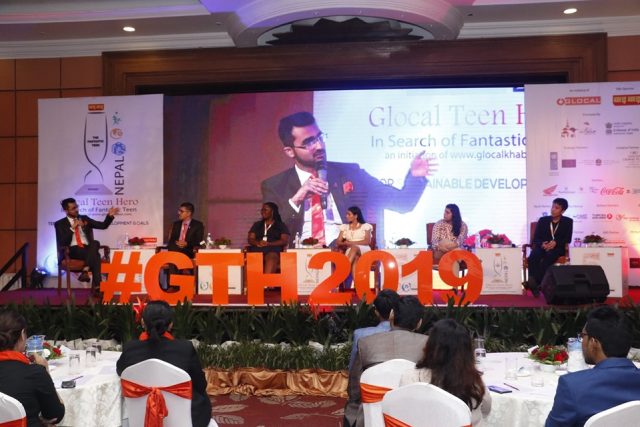In the 21st century, building our socio-perspective is one of the greatest assets. In order to be responsible and thoughtful human being, one must be aware about what is happening around our world. With this in mind, Glocal gathered few extra ordinary individuals from every nook of the world and conducted a Panel Discussion on 1st September 2019.
This panel was moderated by Mr. Asish Thakur, Executive Director at Glocal Pvt. Ltd. who talked with 5 different individuals with different perspectives. The panelists were:
- Mr. Prajesh Khanal from Nepal, an 18 years old Child Rights Activist and Glocal Teen Hero Alumni
- Ms. Maodan Tohouri from USA- a 16 years old Social activist from California
- Ms. Prasansha KC from Nepal – an 18 years old Child rights activist and Winner of Glocal teen hero 2018
- Ms. Vidhi Kohli from India- a 17-year-old Activist and a law student
- Mr. Cavin Dennis Tito Siregar from Indonesia- 19-year Social Activist who is also an Ambassador of the International Model United Nations (IMUN) and Global Youth Model United Nations (GYMUN)
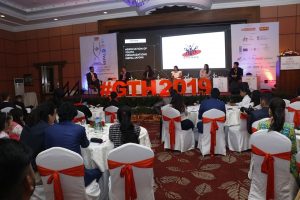
Here’s the gist of the discussion:
Moderator: Please introduce yourself and why are you doing what you are doing?
Prajesh: Hi. I am Prajesh Khanal. I am 18-year-old and I belong to Jhapa district of Eastern Nepal. Well, you asked a difficult question (laughs). Well, I started social activism through Child Club. But I was just a child back then, so I had no idea in what I was getting myself into when I started my journey child club. Then I started environment conservation campaigns from the same child club did then I started to see the response from the children and people. It was because of such feedback, reactions of children and love and support from everyone, I do what I do.
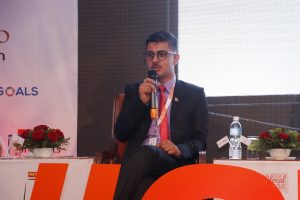
Maodan: Thank you for having me. My name is Maodan Tohuri and I am a social activist from the USA. I am 16 years old and as a response to the question on why I do what I do because I believe in the power of youth. I worked on organizing campaigns and rallies on gun violence prevention and that’s when I realized through my work I wanted to provide infrastructures to youth.
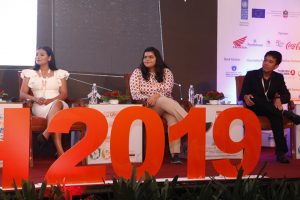
Prasansha: My name is Prasansha KC. I am 18 years old social activist from Nepal working against child marriage and kidnap marriage. When I was younger, I never thought I would be a social activist. There are many stories that motivate me to work as an activist. For instance, one of my friends from my hometown, Rukum, had a miscarriage when she was only 15 while I was getting quality education in Kathmandu at 15 years old. I was heartbroken and didn’t want anyone to go through what my friend went through. So, stories like these motivate me to work.
Vidhi: Hi, my name is Vidhi Kohli and I am 19 years from India. There’s no story behind what I am doing today but it’s just an observation when talking about SDG’s and I think about the root of these problems SDGs are trying to solve. I also think about the solutions to these deep-rooted problems and I realize it is education. There is a fine line between being literate and being educated. Being only literate is useless but being educated matters. Education is something that comes from your action. So, I educate children with the purpose of making them solve the problems in our society.
Cavin: My name is Cavin Dennis Tito Siregar and I am from Indonesia. A year ago I didn’t believe that I could bring a change and start a movement. But, I am currently a brand ambassador of International Model United Nations (IMUN) and Global Youth Model United Nations (GYMUN). The reasons why I am doing this is to change and find myself and to help others find themselves. A year ago, I did my first MUN where I found myself and wanted to expand the impact of the MUN after that. MUN gave me the confidence to speak in front of a mass. Through, MUNs people can realize their own motivation and potential, capability.
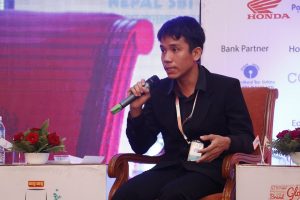
Moderator: Everybody somehow talked about the importance of education, so in your perspective what should we do to be well educated? Vidhi, you can answer that.
Vidhi: I’d like to answer your question with the help of an example. So, on the weekends I go to teach underprivileged children and what I’ve realized is that they’re unaware of the benefits the government is providing them. The reality is that If I teach 50 of them, only 5 of them will be successful because of different structural obstacles and they will be the victim of the reality. But that doesn’t mean they don’t contribute to our society. So, their contribution by being educated and education is a process, while literacy is the first step. Education is a continuous process and people gain perspective through education, little by little. I am here today, and this conference is a process for me to climb above and help me achieve my goal of being a lawyer. Qualifications and degrees don’t really count if you’re not a good human being. You need to talk to people more and gain perspectives.
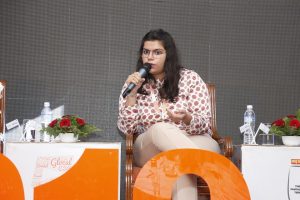 Moderator: Thank you, Vidhi. Talking about education and thinking about Rukum where young girls are getting kidnapped for marriage. Prasansha, as you are working to eradicate such acts and how do you think education can be a part of your campaigns and what is your perspective on this?
Moderator: Thank you, Vidhi. Talking about education and thinking about Rukum where young girls are getting kidnapped for marriage. Prasansha, as you are working to eradicate such acts and how do you think education can be a part of your campaigns and what is your perspective on this?
Prasansha: Education has certain definitions, but when we go to the real world and hear people’s stories, realize the importance of education is more than mere definitions. From my experience, people are educated in terms of doing maths and reading literature but despite all that you commit horrendous acts as child marriage then your education is worthless. Lack of education isn’t the problem but inability to go beyond our social construction and culture. If a young girl grows up to normalize child marriage, then her educated decison would be to marry before 18. For that, awareness is important and teaching them to visualize the implications of the things society have taught them to normalize. We can show them documentaries and teach them something beyond academics which can build a perspective on them.
Moderator: Is there anyone in this room who hasn’t been affected by pollution? (nobody raises their hand) It is a sad reality that, along with development, there has been destruction of forests and environment everywhere. We have the example of Nijgad airport and Amazon as well. And, Prajesh here has been actively involved in many environmental campaigns. Now, given all the environmental problems, what is your perspective on how and where do you want to take it forward?
Prajesh: Thank for the question. When we started our campaigns, one thing I’ve realized from my experience is that- People will not follow what you teach them. No matter how many times you tell people how harmful their practices are, they’re not going to listen to you. So, teaching them is not enough, but making them understand is. To do that, you need to make them visualize the consequences of their problems. Talking about development and environment, I think don’t think about things from a sustainable perspective and with planning. If we make ourselves sustainable, then only the development we want will be fruitful. If we really think about it, development is a never-ending process because we are ambitious beings. But we shouldn’t be doing development works in a reckless way because we might face dire consequences. It is our responsibility to have sustainability in al the development work we do. If we teach young children from a very young age about the concept of sustainability, we can definitely do something for the environment.
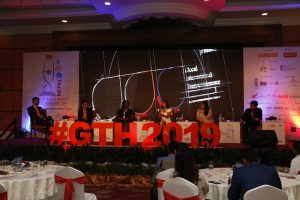
Moderator: I feel like Nepal and India same similar types of social problems because of our many similarities. Now, let’s talk with panelists from the US and Indonesia on the same three different topics of child marriage, education and environment. How are these things taken by your community? What’s the situation there regarding these three? Can you also add youth’s perspective in these issues? Let’s start with Cavin.
Cavin: Thank you for the question. Well, Child marriage isn’t that very common in Indonesia and we don’t see a lot of news about in Media as well. But, if you take a good look at several parts of Indonesia, we can still find some examples. Government is trying to solve the issues of children through education itself. Education is an important step to solve different issues. But, again the concept of education is limited to a curriculum. There are so many unlucky children who don’t get an education.
Talking about the environment, Climate change is an important issue for many Indonesians and people are working on it.
Talking about education, we are trying to improve our curriculum. But there are many types of education we need to opt to. There are informal education along with formal education which are really beneficial for students. For instance, we talk about foreign tourism movement and educating people informally about this movement
Moderator: Great! Thank you for your insights. As you talked about how skilled based education should also be pursued along with formal education, it made me think if Maodan here from the USA would be more familiar with more practical based education of American education system. Socio perspective is more inclined towards practical aspects too. If we can have firsthand experience of education, how can it help people gain perspective? As an American student, how do you think issues of environment, child rights and education handled in the US?
Maodan: All of the issues you mentioned, are the issues in the US. Even though, the issues of child rights are not my area of expertise, but I’ve heard many child rights activists talk about this issue. I want to talk more on climate crisis and education because I’m more aware about problems related to them. There are two particular movements in the US related to climate change and they are: Sunrise movement and US Youth Climate Strike. The US has also contributed drastically in climate change and it has affected countries that haven’t necessarily contributed it. People live in a bubble and it gets back and affects us. There’s a supplemental curriculum that we kind of engage in – Connectivity, Integration and Respect. The activists need to engage in storytelling and make people listen about the problem. People generally ignore these issues because the effects are not firsthand but we slowly have to pay for it. So, the activists like us need to do extra work to make people listen about the nuances of the issue. It is the only way we can build their perspective. Lastly integration, listening to different perspectives and then integrating the feedback then creating solutions. Lastly, going outside ourselves and gaining a respect.
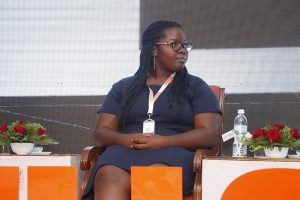
As for education, it is good and bad at the same time. The education is a bit expensive. And the curriculum is only focused on the concepts and ideas of the US only. The things we read needs to go beyond the US if we truly want to gain a perspective about issues of racism, sexism. If our education was not just centered around the US then we could change the way we look around different things happening around the world.
Moderator: Thank you. Okay, Now I want you to answer about the things that youths in your country generally focus on and talk a bit about what they want. I want you to be frank and cool about your answers. Tell me three of the priorities of the youth of your country.
Prajesh: This is a difficult question, indeed. (laughs) Well, the first one would be studying, enjoying their own life. Second one is, sharing. The last one is networking and then enjoying our life
Maodan: My answer is also pretty similar. I’d say the first one is listening to or learning from others. The second one is sharing our stories and who we are. Third one is, enjoying. We need to give ourselves time to enjoy our life amidst all the pressure and work.
Prasansha: If you had asked me this question a year ago, I would have probably said something like prioritizing to keep up with a Game of Thrones (laughs). For now, I also think it is important to have a ‘me time’ because times as such liberate us in a way. That is a priority for many of the youths today in Nepal. Secondly, the youth today want to get a degree, at least a bachelor’s degree. Last one is finding social validation and finding an identity in the society.
Vidhi: Hmm, I think the first priority would be earning money or getting financially stable. Second, is to study. Third, not getting interrupted while they’re working or thinking.
Cavin: Maybe the first thing would be learning and studying. Second this, enjoying and investing in yourselves. The last one is pretty similar to what Vidhi said, i.e. not getting interrupted while we’re working.
Moderator: We have now about ten minutes and I’d like to know of anyone from the audience have any questions for our panelists. Or anything you want to say to the panels.
(raise of hands)
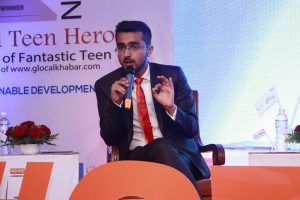
Question 1: Hi! My questions are very simple. Can you tell me about any precise projects or initiative that you’re working on related to practical education? And another question: what do you do when you’re demotivated?
Moderator: Alright! Thank you, that was a great question. I’d like to request my panelists to answer the questions briefly. Let’s start with Cavin.
Cavin: Talking about any initiative related to private education, there are many but don’t think I am fully aware about them
When I am demotivated, I just refer back to what motivated me at first. When you get engaged in MUNs, you have a responsibility to help others learn about this platform. So, I also think about all the people who are willing to learn and grow.
Vidhi: As an Individual, I don’t personally know run organizations, but I go to teach children. But after some time of teaching, I got connected to this club which was formed by college students of Delhi called ‘live to give’. Through this club, they teach underprivileged and street children whose parents don’t have the resources to teach them. Along with basic education, they teach them things like gymnastics, vocals and dancing. Then, the children showcase what they’ve learned in an annual function. Motivating and educating really helps these children and have impacted their lives in several ways.
And to answer your second question, I talk to my mother when I really get demotivated. Our parents are our biggest motivators and my mother is really good at giving advice. When I have a bad day, then she tells me that I haven’t lost anything till now but earned the respect and love of these children whom I’ve helped. That really helps me.
Prasansha: There are many amazing initiatives happening in our country, but I don’t have much of an understanding of initiatives regarding practical education, so I better not give my opinion on that. I’m sorry about that!
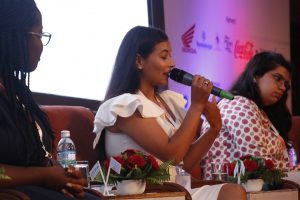
Talking about what gets me pumped up and motivated, I feel like the stories I hear motivates me the most. For instance, a year ago when I was travelling to Rukum which is geographically complex place full of hills and rivers. I had to walk through the hills and cross rivers to reach different destinations because of the lack of transportation. I was carrying a huge bag with me full of school supplies and when I was crossing the river, half of my body was wet. With all that walking, my whole body was aching. That was the moment when I almost gave and started second guessing my decision and motivations to come to this place. I was very demotivated. But the moment I saw the children walking along with me and referred to the stories of my friends, I was pumped up again. I am trying to make a small difference in their lives and the least I can do is change at least one person’s life by making them aware them about kidnap marriage.
Maodan: As for the first question, I work for this organization called student of voice which encourages high school students to get involved in leadership activities and events. Our main goal is to identify student-centric and student-created solutions to address the systemic inequity in the American education system.
As for what motivates me, there are two things I do. The first one is self-care. I want to give myself a space where I can take care of myself amidst all the work. Second one is, talking with the people. This can help me gain a perspective that I might have lost while I was demotivated. It reminds me of the roots of my advocacy.
Prajesh: Okay to answer your first question, I have heard of teenagers working on practical and hands on learning education but I’m not fully aware about it, so I’d like to skip this question.
And to answer your second question, I do get demotivated multiples times. Especially, when people don’t believe in your campaigns. When, they deny climate change and things as such, it really saddens me. So, what I do is I try to keep calm and count all the encounters that have demotivated me and help them get me pumped up. I think about all my successes and failures and reevaluate them with an open mind and every time, I get to the conclusion that my work has impacted many lives.
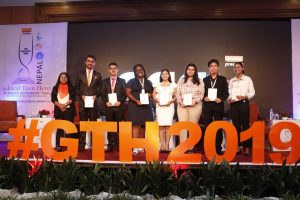
Moderator: Okay, Thank you so much for your insights! Can we have another question?
(raise of hands)
Question 2: So, we have discussed about many issues in this panel discussion. But, I feel like the biggest problem today is lack of humanity among people and I feel this every day. The human virtues have been lost somewhere along the way. So, how concerned are you about teaching people about humanity?
Moderator: I think Vidhi here would be the right person to answer this question as you teach little children. Do you teach your students about human virtues?
Vidhi: As a law student, I try my best to make people aware about human rights and the laws of the country. I am only a tutor to these students, but I also teach these little ones about human rights and the distinction between what is good and bad. I don’t think our education won’t teach you basic morality but it’s something that you should be learning yourselves. I also think, these innocent children teach us about humanity and there’s still humanity left in our world when you look at them. I really believe that humanity is there, but if there’s not, you’ve got to create it!
Moderator: Great! So we’ve reached the end of our discussion and I believe that our audience here had a fruitful session listening to your perspectives. You guys are the changemakers and I was more than happy to moderate you. Thank you so much for your time!

